Checking in with our epA 2019 winners – a blog series: WASHKing

In this 11-part blog series, we will be checking in with our empowering people. Award (epA) 2019 winners to see what they’ve been up to since our most recent award ceremony in Cairo last July. Check out what’s new with WASHKing!
Below is an interview with Dieudonne Kwame Agudah, CEO of WASHKing.
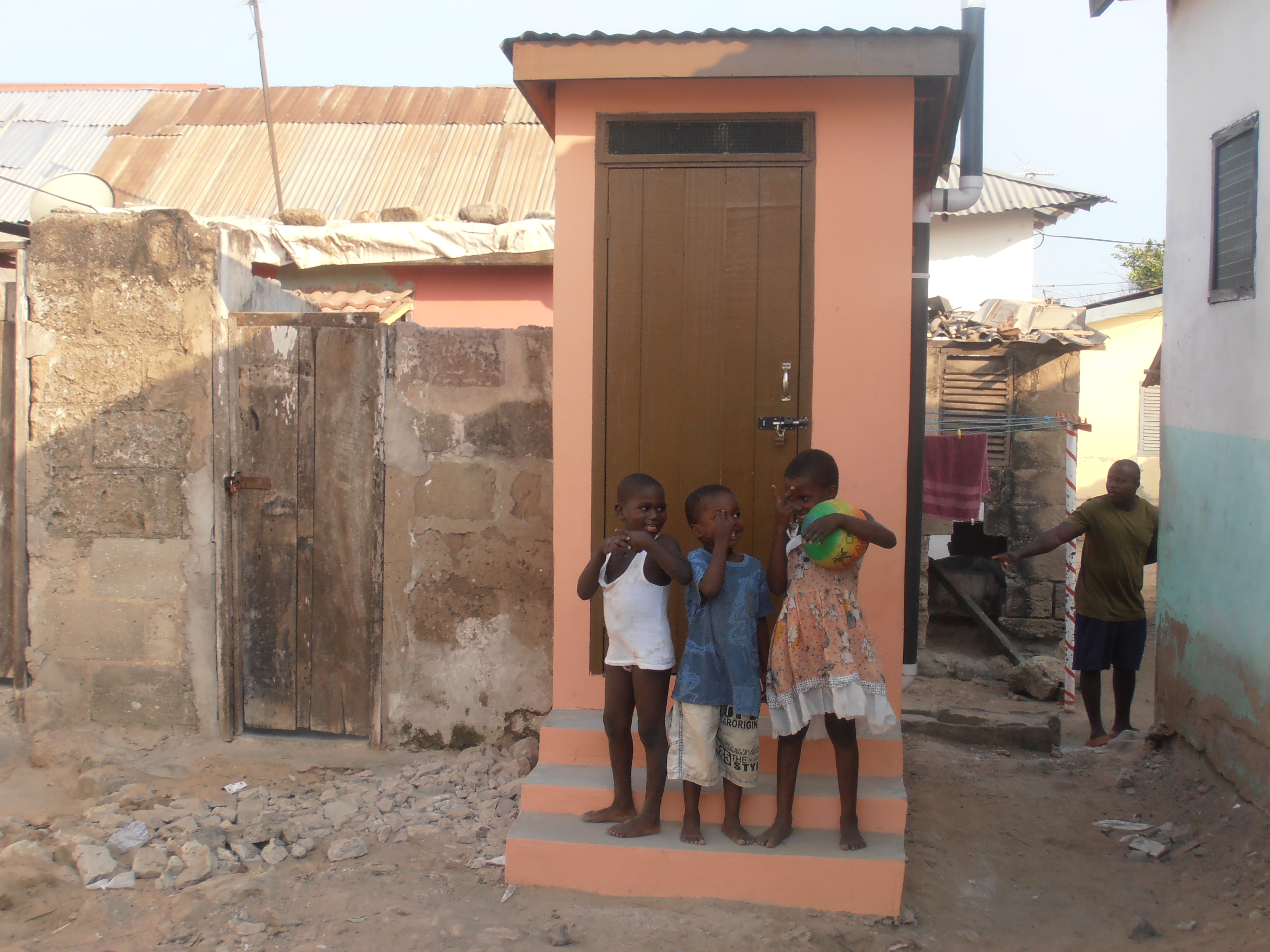 Local children happily playing in front of WASHKing’s biodigester toilet.
Local children happily playing in front of WASHKing’s biodigester toilet.
Siemens Stiftung: Firstly, can you explain to your fellow empowering people. Network (epN) members and readers what you do, where you do it, and, most importantly, why?
Dieudonne: WASHKing is a social sanitation enterprise providing low-income and under-served communities with access to sanitation products at an affordable price. WASHKing produces, supplies and installs accessible and eco-friendly high-quality biodigester toilets built locally by artisans and using regionally available materials. Flexible payment terms, training on hygiene and after-sales services, and technical and vocational education and training on high-in-demand skills along the sanitation value chain complement the package.
Where we do operate and why?
For us it is about increasing access to high quality sanitation facilities at an affordable price in order to end open defecation and improve poor sanitation situations in communities of our work. The goal, therefore, is to achieve enhanced impacts of improved access to clean water and sanitation, good health and well being, and decent work and economic development in low-income, under-served urban communities in the Greater Accra Region, Ghana at large, and the continent of Africa. The main target groups are under-served and low-income urban households and institutions with poor or no access to good toilets. There is a challenge. According to UNICEF, 62 percent of Africans lack access to adequate sanitation, and in 2017, only 15 percent of Ghanaians had access to improved sanitation with close to 4.8 million practicing open defecation leading to deep public health and environmental issues. Even more serious, UNICEF Ghana reveals that the country records 4,000 annual diarrhea death cases. Economically, the World Bank estimated in 2012 that beside loss of families’ productive economic hours, Ghana’s economy loses US$290 million each year due to poor sanitation. The problem equally brings environmental pollution, risks of sexual assault, missed schooling and poverty. We want to help to positively change that narrative.
Siemens Stiftung: More than half a year ago, you were a winner of the empowering people. Award 2019. What has/have been the major change(s) for your company and team since then? For you as an entrepreneur?
Dieudonne: To begin with, winning the empowering people. Award 2019 was not only an important achievement for us, but also, we believe it came at the right time to enhance credibility, exposure and opportunities not only in Ghana but beyond. The award really showcased to the world the important work we are doing to bring crucial positive social, economic and environmental impacts for communities and society at large.
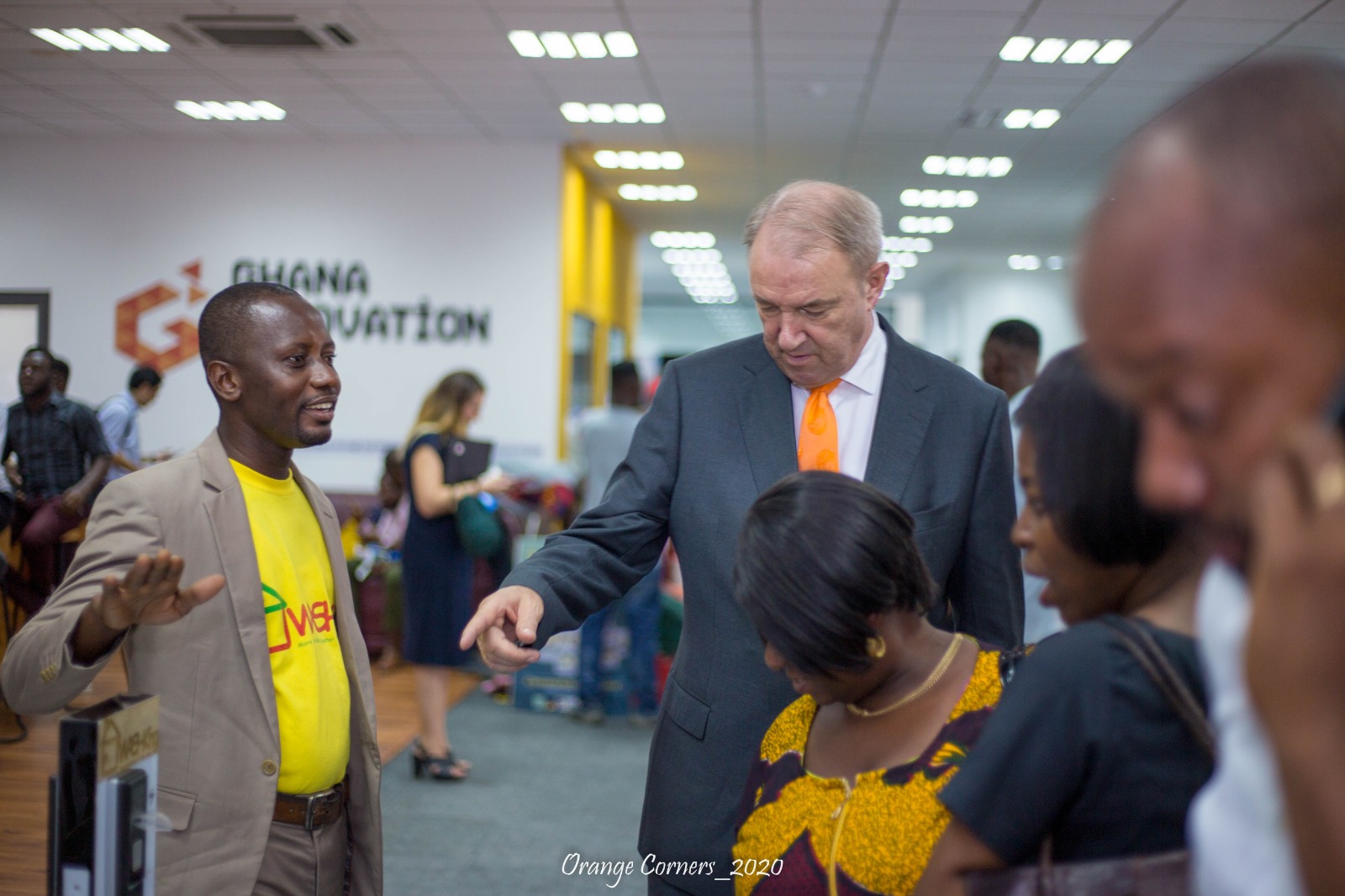 Dieudonne in a meeting with the Dutch ambassador.
Dieudonne in a meeting with the Dutch ambassador.
We have had the opportunity to be part of entrepreneurship mentorship program which exposed us to talented mentors, business tools and skills relevant for taking our enterprise to the next level. Every now and then we attract more audience from sector players including local assembly authorities. More so, another area we have had a significant change in is improved research and development in our work. Winning the prize money has really helped us invest more into research and development which has supported us in developing important, innovative pay-as-you-go technology which does not only put us ahead of others but also help us serve our target groups more for better impact.
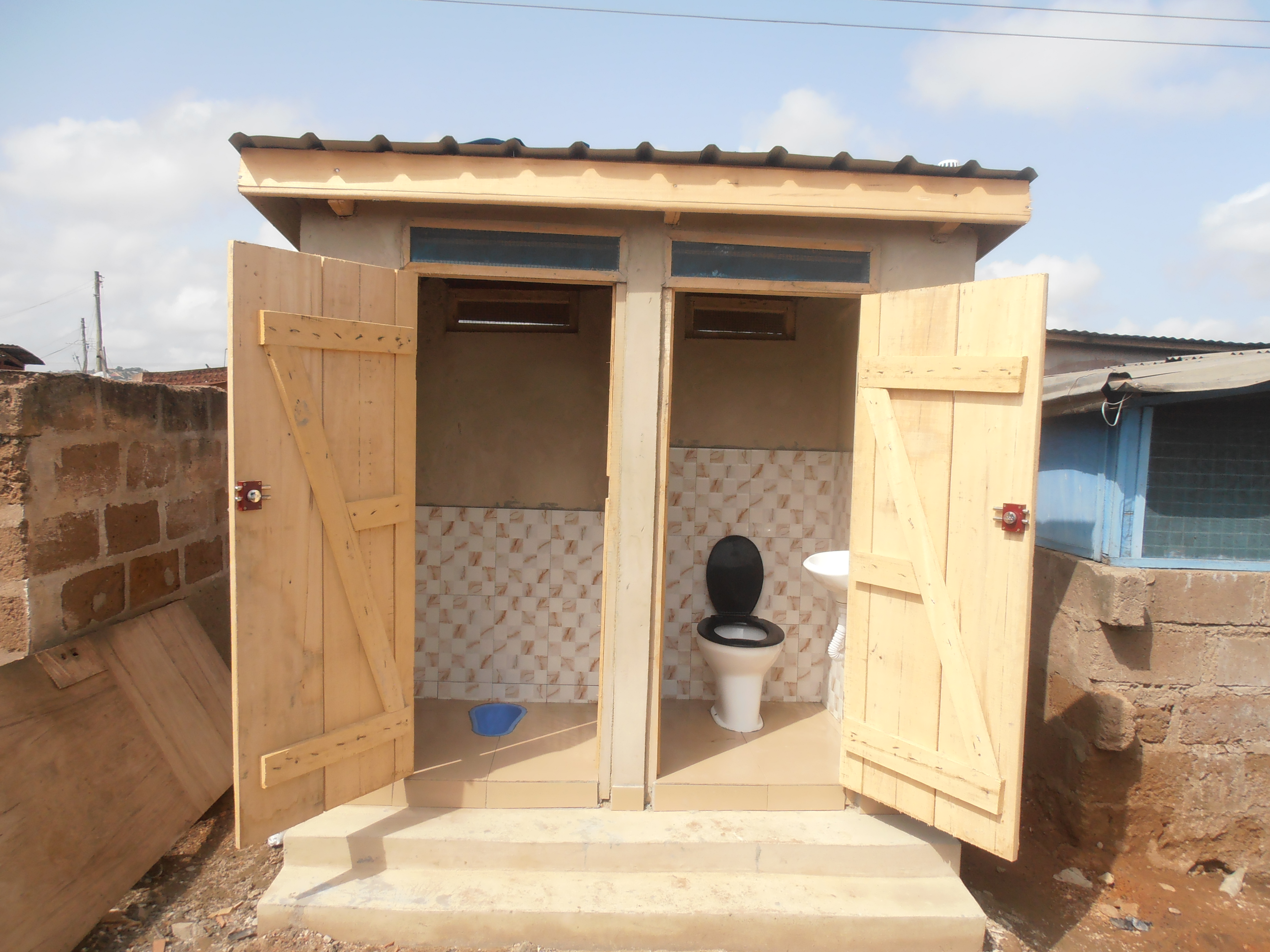 A newly-finished biodigester toilet featuring two seat types.
A newly-finished biodigester toilet featuring two seat types.
Siemens Stiftung: What has been your biggest success, personally or professionally, since then?
Dieudonne: As I mentioned, winning the award has helped us attain other important successes. Among them is doubling of our positive impacts on communities by building more toilets. Previously, we had built a little more than 200 toilets. But now we have built over 450 toilets, positively impacting over 4,500 low-income and under-served people. Through this, we have: provided more job opportunities and improved income, improved health conditions and well being, enhanced access to better sanitation, water and environmental surroundings, and empowered communities to be productive and break away from the cycle of poverty.
Another significant achievement since then is our breakthrough with smart lock technology to further enhance affordability and unlock uninterrupted access to good sanitation. Also, we went on to win access to participate in both international and local entrepreneurship training and mentorship programs, like the enpact mentorship program.
Siemens Stiftung: What are you working on now? And what are your future plans?
Dieudonne: There are some key activities we are presently undertaking to ensure that we grow sustainably and continue to make more triple-bottom-line impacts (social, environmental and economic) by building more improved toilets, as well as significantly contributing to local implementation of sustainable development goals. Notable among them are: (1) deployment of electronic lock service-toilet (PAYGO toilet) to unlock uninterrupted access to good sanitation to all, especially low-income customers; (2) the establishment of a revolving fund for financing costs related to toilet construction;
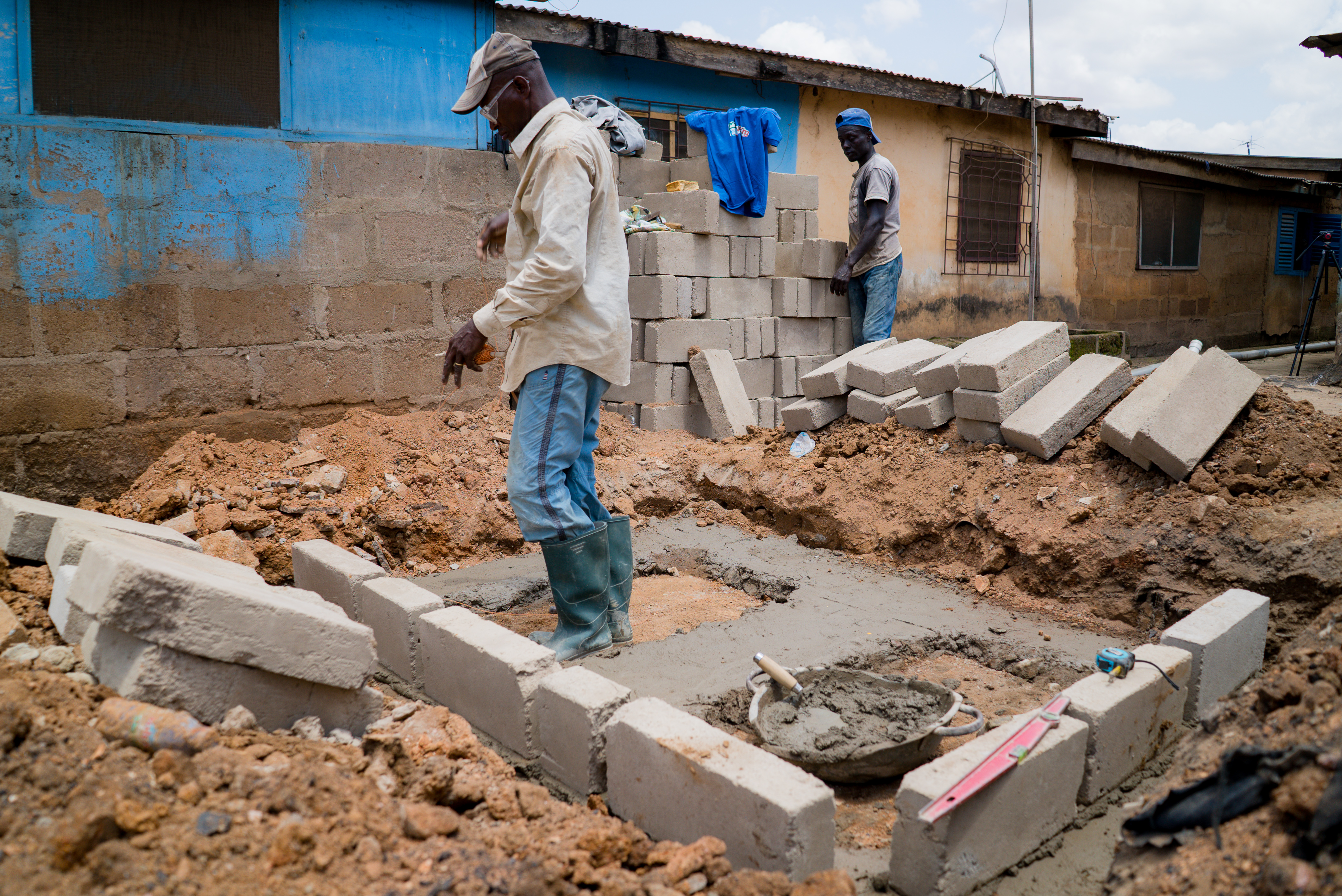 Laying the foundation for a new toilet – an important part of any construction project.
Laying the foundation for a new toilet – an important part of any construction project.
(3) improving design of our toilet technology to significantly enhance adoption by, and supply to, under-served and low-income communities; and (4) development of improved sustainable partnerships with companies having interest in the promotion of good sanitation so we can build more toilets.
We have future plans for the next 10 years aimed at sustainable expansion and growth to make more sustainable impact. This includes the following:
- Setting up an effective supply chain;
- Regional and international expansion (i.e., Sierra Leone and Nigeria), and;
- Develop a strong base of key: employees, partners and customers to, for example, improve impact:
- Build >40,000 toilets
- Create >320,000 job opportunities
- Improve health and productivity of >400,000 under-served and low-income people
- Train >1,000 Master Sanitation Artisan Apprentices
- Support >500 Apprentice Sanipreneurs
- Increase assets and investments (i.e. ICT and improved R&D) to support development of services to better sell, track, optimize and get regular feedback to well serve low-income people.
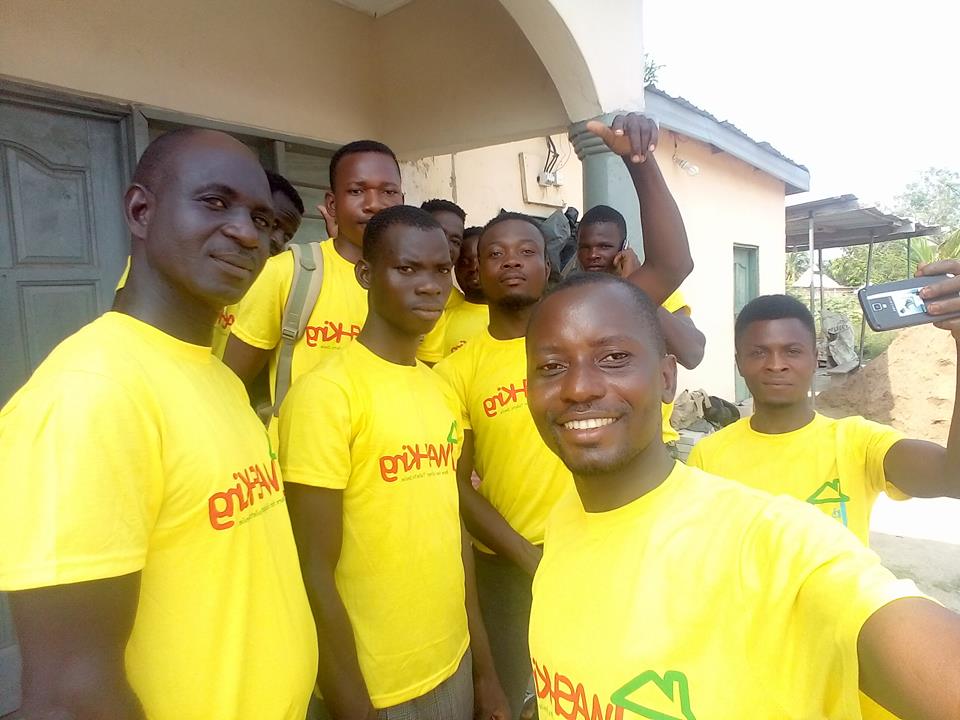 A selfie with some of WASHKing’s team members. Working hard every day to bring better sanitation to Ghanaians.
A selfie with some of WASHKing’s team members. Working hard every day to bring better sanitation to Ghanaians.
Siemens Stiftung: With your membership, in what way(s) do you hope to benefit from epN? And if applicable, how have you already gained from your connection to the ecosystem?
Dieudonne: Among the things that inspired us to apply for the epAward 2019 is the fact that we would have access to a strong support system, network and investments to be able to achieve our organizational goals. The support from everyone in the network has been very helpful, inspiring and game-changing. Additionally, our involvement has really helped us to continually access information on relevant opportunities (i.e., funding, skills training, and knowledge) and expert support to scale our impact and grow our business sustainably. For instance, we have recently applied for a growth funding opportunity which was exclusively made available to epN members. Besides, Siemens Stiftung is presently supporting us with expert assistance to help improve the design of our toilet technologies.
Siemens Stiftung: A big thank you, Dieudonne and team, for sharing what you are currently work on at WASHKing. We look forward to seeing your plans come to life and wish you well with your enpact mentorship program!